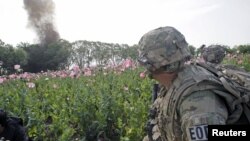LONDON - NATO is rushing its withdrawal from Afghanistan and could risk reversing the gains made there during the past decade, according to a new report. The Afghanistan Analysts Network report was released before a NATO summit in Chicago.
"Western governments need to be as concrete as possible, vis-a-vis Afghanistan, that after 2014 the country will not be forgotten again as happened last time when the Soviet occupation forces withdrew in 1989," said Thomas Ruttig from the Afghanistan Analysts Network in Germany.
The report, called "Beating a Retreat," was written by former European Union advisor Barbara Stapleton. It says NATO policy needs to be flexible if long-term security goals are to be achieved.
Priorities need to be security, governance
The report says transition of security to Afghan control needs to be related to the condition of security, development, and governance.
Ruttig said right now the needs of Afghanistan are not driving the foreign agenda. "The transition timeline is very much dependent on agendas in the countries, which have sent troops to Afghanistan themselves, while not sufficiently looking at conditions in Afghanistan as they evolve," he said.
International combat troops are to pull out of Afghanistan by the end of 2014. NATO says Afghan government forces are on track to take responsibility for security. The details of the withdrawal are to be hammered out Sunday at the NATO summit in Chicago.
Ruttig said the Western alliance must focus on ensuring effective political institutions are in place. He said the groundwork for that has been laid and now it needs to take effect.
"There is a relatively good constitution. There are laws; there are provisions for a pluralistic political situation in Afghanistan. But much of it has remained on paper, has not been implemented," said Ruttig.
Agriculture, infrastructure called key
Afghanistan analyst David Livingstone, with the London-based research group Chatham House, said long-term involvement in social welfare programs, agriculture and the development of national infrastructures like power and irrigation will be key to the country's stability.
"That has to be an aim for the politicians. And no matter what their rather public standpoint may be. If you do not manage this correctly it just makes the problem of the late '90s and early 2000's occur again," said Livingstone.
Recent opinion polls show that American support for the war in Afghanistan is down to 27 percent.











